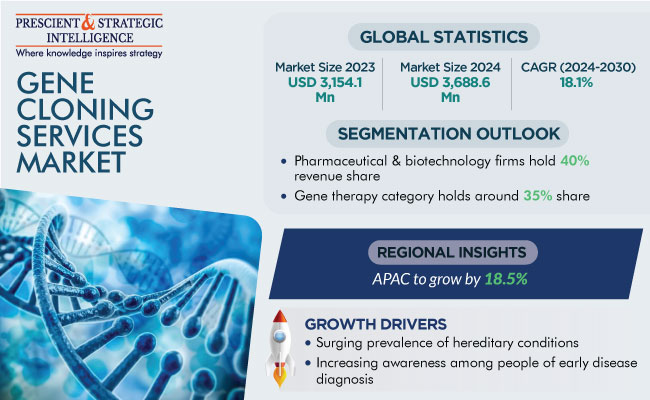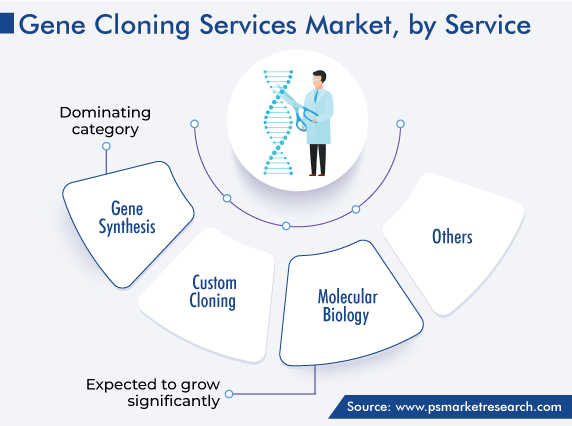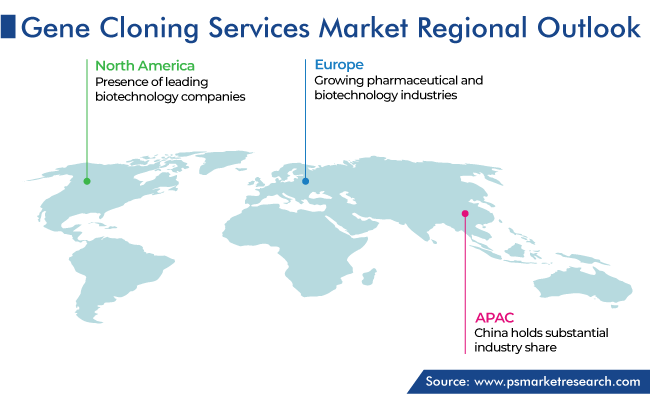Report Code: 12828 | Available Format: PDF | Pages: 250
Gene Cloning Services Market Size and Share Analysis by Service (Custom Cloning, Molecular Biology, Gene Synthesis), Application (Gene Therapy, Vaccine Research, Agricultural, Gene Synthesis), Gene Type (Stranded Gene, Complex Gene), End User (Clinical Laboratories, Pharmaceutical & Biotechnology Firms) - Global Industry Demand Forecast to 2030
- Report Code: 12828
- Available Format: PDF
- Pages: 250
- Report Description
- Table of Contents
- Market Segmentation
- Request Free Sample
Gene Cloning Services Market Size & Share
The global gene cloning services market value is estimated at USD 3,154.1 million in 2023, which is expected to reach USD 10,019.6 million by 2030, growing at a CAGR of 18.1% during 2024–2030.
The growing prevalence of chronic ailments, increasing demand for precision medicine, and significant incidence of inherited conditions are expected to contribute to the growth of the market. Additionally, the significant rise in research in the medical field due to the surge in the expenditure by governments, growth of the biotechnological industry, and technological advancements in genetics are predicted to boost the market revenue in the coming years.

The demand for personalized medicine is growing significantly as people are increasingly becoming aware of the importance of their physical wellbeing. Moreover, there has been a significant surge in the need for quality healthcare as patients demand more-accurate and customized healthcare services for better diagnosis and treatment. The field of personalized medicine uses patients’ genetic profiles to understand, diagnose, and provide treatment for existing ailments.
Significant Prevalence of Chronic Disease To Drive Industry
There has been a rising adoption of sedentary lifestyles, which are characterized by frequent alcohol consumption, smoking, intake of fast food, and little physical activity. The adoption of this unhealthy lifestyle is significantly worsening people’s health and leading to the development of several long-term diseases. These ailments can even sometimes result in the death of an individual. This is, thus, resulting in a significant surge in the demand for more-accurate and effective treatment solutions.
Gene cloning is advantageous and, therefore, extensively used in the discovery and development of drugs. In order to aim different therapeutic compounds at diseases, particular variations in genes are identified using the method of cloning. Moreover, these services give detailed information about specific genes and help identify receptor subtypes, which, in turn, aids in the production of vaccines.
There has been a rapid surge in the incidence of diabetes in developing nations. One of the biggest factors contributing to this condition’s growing burden is the significant prevalence of obesity due to the rising consumption of processed food items, including edible oils, artificial sweeteners, animal products, and refined carbohydrates. Moreover, a significant decline in the consumption of fruits and vegetables is being observed. Furthermore, the rise in the level of urbanization has resulted in the reduction in physical labor, because of the change from agricultural labor to manufacturing services in a number of developing nations.
Therefore, the rising diabetes incidence due to all these factors has led to a rapid surge in the development of synthetic human insulin, which is used by millions of individuals to control blood glucose levels. Gene cloning plays a major role in the production of synthetic human insulin, which is why diabetes is a key growth factor for this industry.
Moreover, the process has significant applications in therapeutics, where it is used to prevent or cure an ailment by rectifying the underlying inherited issue. The gene cloning services market will also witness a rapid surge in revenue during the projection period due to the significant application of this approach in the field of biomedical sciences.
Gene Synthesis Category Dominates Service Segment
The gene synthesis category leads the service segment with a market share of 45% in 2023. This is credited to the widening application of this technology across several domains with the rising number of research activities revolving around it globally.
There has been a surge in the usage of gene synthesis technology among scientists who are using procedures such as CRISPR genome editing, transcription activators, including effectors; and synthetic biology to come up with better and more-advanced solutions across many life sciences fields. Gene synthesis has a wide range of applications in neurosciences, therapeutic antibody engineering, plant biology, cancer biology, genetics, and biochemistry.
Moreover, the approach is becoming an economical substitute to conventional cloning and molecular biology processes. This is because conventional cloning has multiple steps, including cloning strategy design, gel extraction, and PCR, which are time-consuming and require considerable human resources.
Furthermore, synthetic genes are much less expensive than DNA sequencing services and cloning kits. In addition, they significantly improve the performance of the DNA, by allowing for the optimization of the codon, which efficiently improves the expression of proteins. They also offer convenience over conventional cloning methods as they eliminate the requirement for physical templates, which is associated with conventional cloning process.

Gene Therapy Category Leads Application Segment
The gene therapy category dominates the application segment with a market share of 35% in 2023. This is because such a therapy has the potential to cure illnesses or diseases that were previously deemed incurable. Researchers and scientists have identified over 50,000 inherited diseases caused by mutations in a single gene. With a deeper understanding of protein pathways and gene expression, more therapies can be tested and proven effective for humans. For instance, gene therapy has restored the vision of many people who were suffering from inherited, gradual blindness.
Additionally, this type of therapy has proven to be beneficial for the treatment of cancer over chemotherapy, which is less selective and can result in non-specific toxicity. Therefore, many such techniques are used for the treatment of cancer, such as immune modulation, treatment of gene defects, oncolytic virotherapy, genetic manipulation of apoptosis and antisense, RNAi strategies, and anti-angiogenic gene therapy. Cancers of the liver, bladder, colorectal system, ovaries, pancreas, lungs, kidneys, and brain can be cured by gene therapy.
Agricultural applications are expected to display fast growth during the forecast period. This is attributed to the increasing application of gene cloning to improve the productivity of crops sustainably. The combination of traditional sequencing platforms with those that offer a higher throughput has improved the availability of genomic resources, such as expressed sequence tags (ESTs), genetic sequence polymorphisms, bacterial artificial chromosome (BAC) end sequences, whole-genome (re)sequences, gene expression profiles, and genome-wide association study data.
Additionally, nostoc, which is a cyano-bacterium, is a type of nitrogen-fixing bacterium. It, along with the required genes, is used to enhance crop health, as well as productivity. This results in a decrease in the usage of fertilizers; therefore, crops produced with such approaches are free from agrochemicals and are better in nutritional value.
| Report Attribute | Details |
Market Size in 2023 |
USD 3,154.1 Million |
Revenue Forecast in 2030 |
USD 10,019.6 Million |
Growth Rate |
18.1% CAGR |
Historical Years |
2017-2023 |
Forecast Years |
2024-2030 |
Report Scope |
Market Trends, Drivers, and Restraints; Revenue Estimation and Forecast; Segmentation Analysis; Impact of COVID-19; Companies’ Strategic Developments; Market Share Analysis of Key Players; Company Profiling |
Segments Covered |
By Service; By Application; By Gene Type; By End User; By Region |
Explore more about this report - Request free sample
North America Is Highest Revenue Contributor
As per our regional analysis, North America accounts for the largest share, of around 55%, in 2023. This is attributable to the significant research and development activities in the biotechnology and pharmaceutical sectors in this region. Additionally, the high prevalence of chronic disease, existence of a robust healthcare system, and significant adoption of advanced technologies are contributing to market growth.
The regional market is also being driven by the presence of leading biotechnology companies. Moreover, a huge number of genomic research projects and significant funding from various venture capitalists and government organizations are contributing to the market growth in the region. Besides, the increasing health awareness and adoption of genetic testing services among the people in the region are encouraging researchers to explore genomics for the development of treatments for various inherited disorders.
Canada holds a significant share in the North American region. This is attributed to the existence of a robust healthcare infrastructure, growing public awareness of early disease diagnoses, high disposable income, and rising adoption of gene therapies to treat different types of cancers.
Additionally, Europe is expected to account for a significant share during the forecast period. This is owing to the rising prevalence of chronic diseases, improving healthcare infrastructure, increasing utilization of gene cloning in diagnostics and drug discovery & development, and growing pharmaceutical and biotechnology industries.

Moreover, countries such as the U.K., France, Germany, Italy, Spain, Estonia, and Denmark have made notable contributions to advancing the genomics market in the region, with significant investments in related research projects. For instance, the U.K. is working on the 100,000 Genomes Project, which aims to look at the genomic sequences of patients with rare diseases and cancer in the country.
Top Gene Cloning Service Providers Are:
- Thermo Fisher Scientific Inc.
- Genscript Biotech Corporation
- Eurofins Scientific SE
- Charles River Laboratories International Inc.
- Takara Bio Inc.
- Creative Biogene
- Synbio Technologies
- Aragen Life Sciences Ltd.
- Sino Biological Inc.
- Curia Global Inc.
Market Size Breakdown by Segment
This report offers deep insights into the gene cloning services market, with size estimation for 2017 to 2030, the major drivers, restraints, trends and opportunities, and competitor analysis.
Based on Service
- Custom Cloning
- Molecular Biology
- Gene Synthesis
Based on Application
- Gene Therapy
- Vaccine Research
- Agricultural
- Gene Synthesis
Based on Gene Type
- Stranded Gene
- Complex Gene
Based on End User
- Clinical Laboratories
- Pharmaceutical & Biotechnology Firms
Geographical Analysis
- North America
- U.S.
- Canada
- Europe
- Germany
- U.K.
- France
- Italy
- Spain
- Asia-Pacific
- Japan
- China
- India
- South Korea
- Australia
- Latin America
- Brazil
- Mexico
- Middle East and Africa
- Saudi Arabia
- South Africa
- U.A.E.
The market for gene cloning services values USD 3,154.1 million in 2023.
The gene cloning services industry is growing at a CAGR of 18.1%.
Governments’ R&D funding plays a key role in the growth of the market for gene cloning services.
The gene cloning services industry is propelled by the rising incidence of chronic diseases and growing focus on agricultural biotechnology.
Gene synthesis services generate the highest revenue in the market for gene cloning services.
Gene therapy applications hold the largest gene cloning services industry share.
APAC is the fastest-growing market for gene cloning services, while North America is the largest.
Want a report tailored exactly to your business strategy?
Request CustomizationWant an insight-rich discussion with the report author?
Speak to AnalystOur dedication to providing the most-accurate market information has earned us verification by Dun & Bradstreet (D&B). We strive for quality checking of the highest level to enable data-driven decision making for you
Our insights into the minutest levels of the markets, including the latest trends and competitive landscape, give you all the answers you need to take your business to new heights
With 24/7 research support, we ensure that the wheels of your business never stop turning. Don’t let time stand in your way. Get all your queries answered with a simple phone call or email, as and when required
We take a cautious approach to protecting your personal and confidential information. Trust is the strongest bond that connects us and our clients, and trust we build by complying with all international and domestic data protection and privacy laws